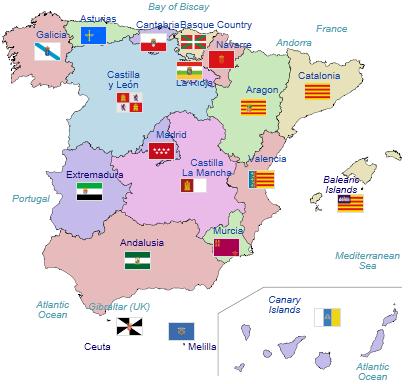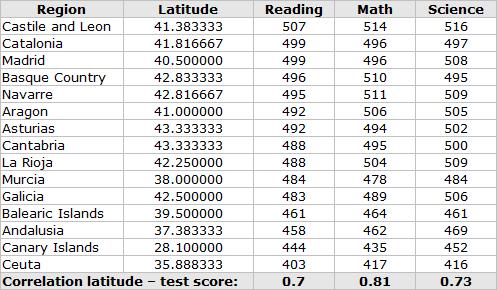**update 08/03/12: see bottom of post.**
to find out whether or not there are regional differences in iq in spain, the reluctant apostate suggested looking at the pisa scores (which seem to be a good proxy for iq scores) from 2009 for spain, which are broken down regionally here. so i did.
they look like this:
Reading
Spain (Castile and Leon) 507
Spain (Catalonia) 499
Spain (Madrid) 499
Spain (Basque Country) 496
Spain (Navarre) 495
Spain (Aragon) 492
Spain (Asturias) 492
Spain (Cantabria) 488
Spain (La Rioja) 488
Spain (Murcia) 484
Spain (Galicia) 483
Spain (Balearic Islands) 461
Spain (Andalusia) 458
Spain (Canary Islands) 444
Spain (Ceuta and Melilla) 403
Mathematics
Spain (Castile and Leon) 514
Spain (Navarre) 511
Spain (Basque Country) 510
Spain (Aragon) 506
Spain (La Rioja) 504
Spain (Catalonia) 496
Spain (Madrid) 496
Spain (Cantabria) 495
Spain (Asturias) 494
Spain (Galicia) 489
Spain (Murcia) 478
Spain (Balearic Islands) 464
Spain (Andalusia) 462
Spain (Canary Islands) 435
Spain (Ceuta and Melilla) 417
Science
Spain (Castile and Leon) 516
Spain (La Rioja) 509
Spain (Navarre) 509
Spain (Madrid) 508
Spain (Galicia) 506
Spain (Aragon) 505
Spain (Asturias) 502
Spain (Cantabria) 500
Spain (Catalonia) 497
Spain (Basque Country) 495
Spain (Murcia) 484
Spain (Andalusia) 469
Spain (Balearic Islands) 461
Spain (Canary Islands) 452
Spain (Ceuta and Melilla) 416
as you can see, the further south — or offshore — you go in spain, the lower the pisa scores. here’s a map of the different regions in spain:
in fact, while the scores of most of the regions become gradually lower by a few points in each instance, the scores of the four lowest regions (andalusia, the balearic islands, the canary island, and ceuta & melilla [which are actually in morocco]) drop off dramatically by anywhere from 14 to 22 points compared to the next highest scoring region (e.g. in reading, the balearic islands score was 461, while the next highest was galicia at 483, a 22 point difference).
v. weiss suggests that a maths pisa score of 463 — the closest to the andalucia score of 462 — is the equivalent of an iq of 93, whereas a pisa score of 514 — the score of the highest scoring region, castile and leon — is the equivalent of an iq of 99.
if he’s correct, that would give the southernmost region of spain an iq like that of greece, while the average iq of people in one of the largest northern regions is more like that of poland or hungary.
so, maybe there is a north vs. south iq division in spain like the one found in italy (although the existence of that one has been disputed).
previously: españa al norte frente al sur
update: see also the reluctant apostate’s awesome maps of italy and spain’s pisa scores, which are awesome (the maps, that is, not necessarily the scores). (~_^)
update 08/03/12: frank is doubtful that there is a north-south divide in pisa scores in spain. the numbers say differently (latitudes grabbed from geohack):
(note: comments do not require and email.)







